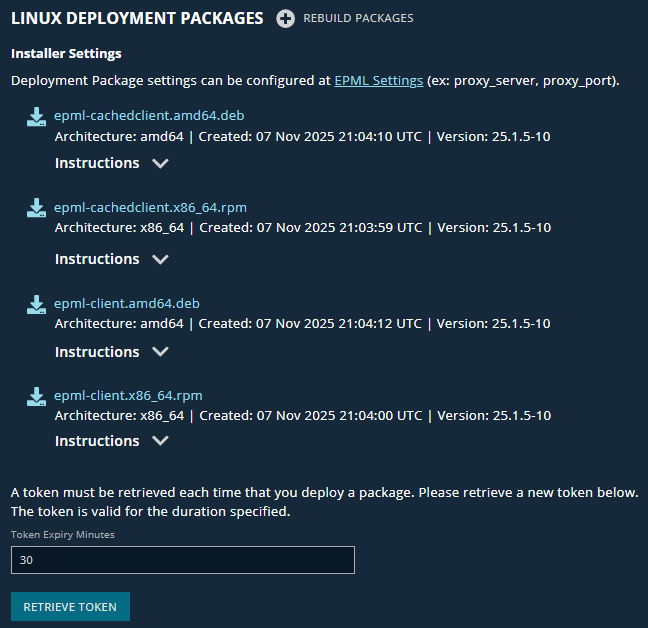Activate the installation EPM-L | EPM-L
After you've created, downloaded, and installed your packages, you must activate the installation.
Important information prior to activation
Prior to use, the EPM-L client installation must be activated using a registration binary (pbactivate), to obtain the proper client certificates for the application and finalize its configuration.
The pbactivate binary requires a token string obtained from the EPM-L console as input. When it completes its operation, it creates two files:
- /etc/pbscert.crt – The per-endpoint client machine certificate.
- /etc/pbskey.pem – The private key for the client machine certificate.
BeyondTrust recommends properly protecting these files, to avoid spoofing by malicious actors.
WarningDo not share certificates between machines. Clients cannot use a certificate issued to a different machine.
Retrieve the token
- From the top left of the BeyondTrust Home page, click
 > Endpoint Privilege Management for Linux > Installers.
> Endpoint Privilege Management for Linux > Installers.
The Linux Deployment Packages page displays. - At the bottom of the page, click Retrieve Token.

- Enter a token expiry value, in minutes.
Supported values are 30 minutes and greater.
- Click the Copy icon to copy the token string to your machine browser's clipboard.
Activate the installation
- Retrieve the token from the Linux Deployment Packages page.
- Navigate to the terminal connected to the EPM-L client as root.
- Run pbactivate with the -t option to specify the copied token string as its command-line parameter:
[root@client~] /usr/sbin/pbactivate -t eyJhbGciOiJNEQIgEk...vM5o1qbhoJfsI7beI7w
About to contact epm.beyondtrust.io
Received request results. Verifying...
Verified data integrity.
Stored client authentication data.- If pbactivate runs with an incorrect token string, it reports "Malformed activation token".
- If pbactivate runs with a token that has expired, it reports "Activation token expired".
- Provide the token string to pbactivate.
Provide the token string in one of the following ways (listed in order of preference):
command-line parameter
The command-line parameter is when -t is used (recommended).
/usr/sbin/pbactivate -tstdin via a file redirect
A file redirect might be:/usr/sbin/pbactivate < token.txtstdin via a pipe
A pipe might be:echo "eyJhbGciOiJS...kBfE_W3i4g" | /usr/sbin/pbactivateor
echo ${TOKEN} | /usr/sbin/pbactivateenvironment variable
The environment variable to use is `PBATOKEN`.export PBATOKEN=eyJhbGciOiJS...kBfE_W3i4g ... /usr/sbin/pbactivatestdin via TTY if in foreground
If the program is being invoked from a foreground terminal session, pbactivate will prompt the user to enter the token (this is where you paste the token in):
/usr/sbin/pbactivate Enter token:
The package installation and activation completes.
Updated about 2 months ago
